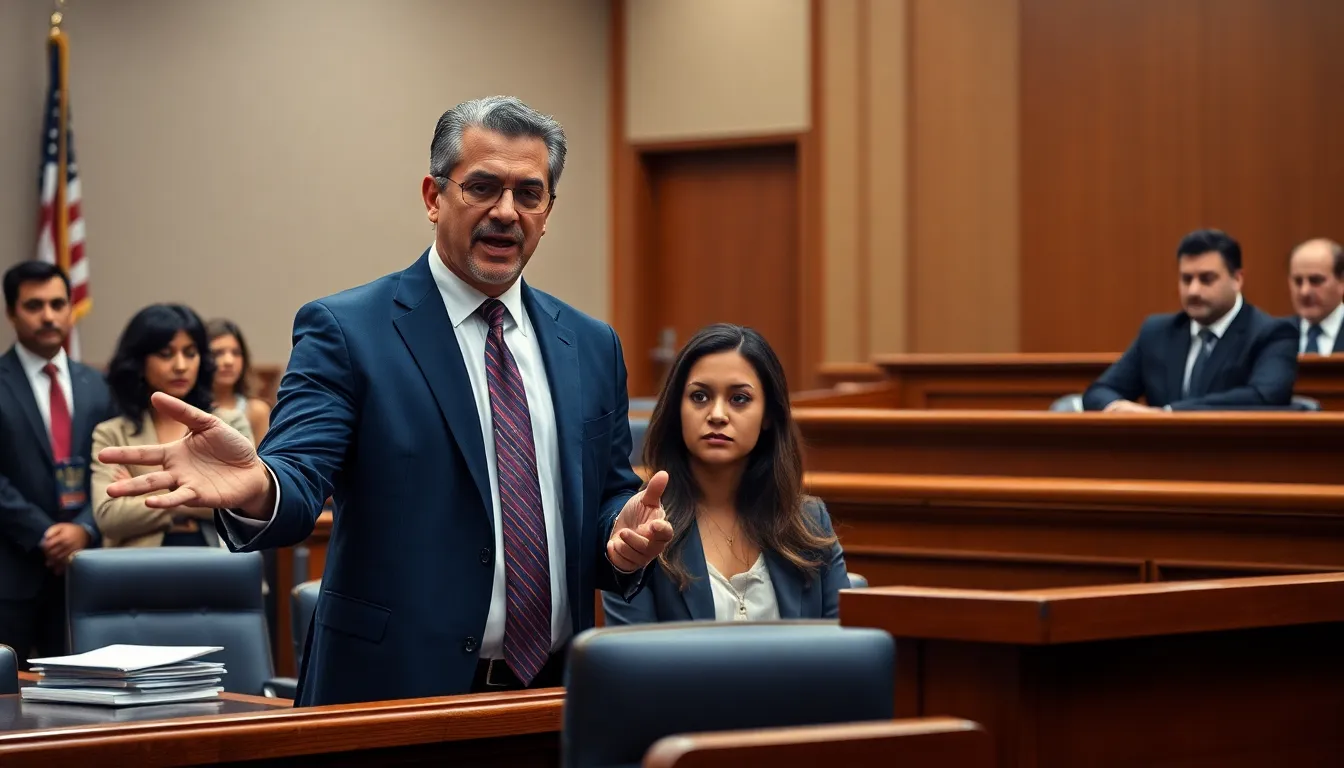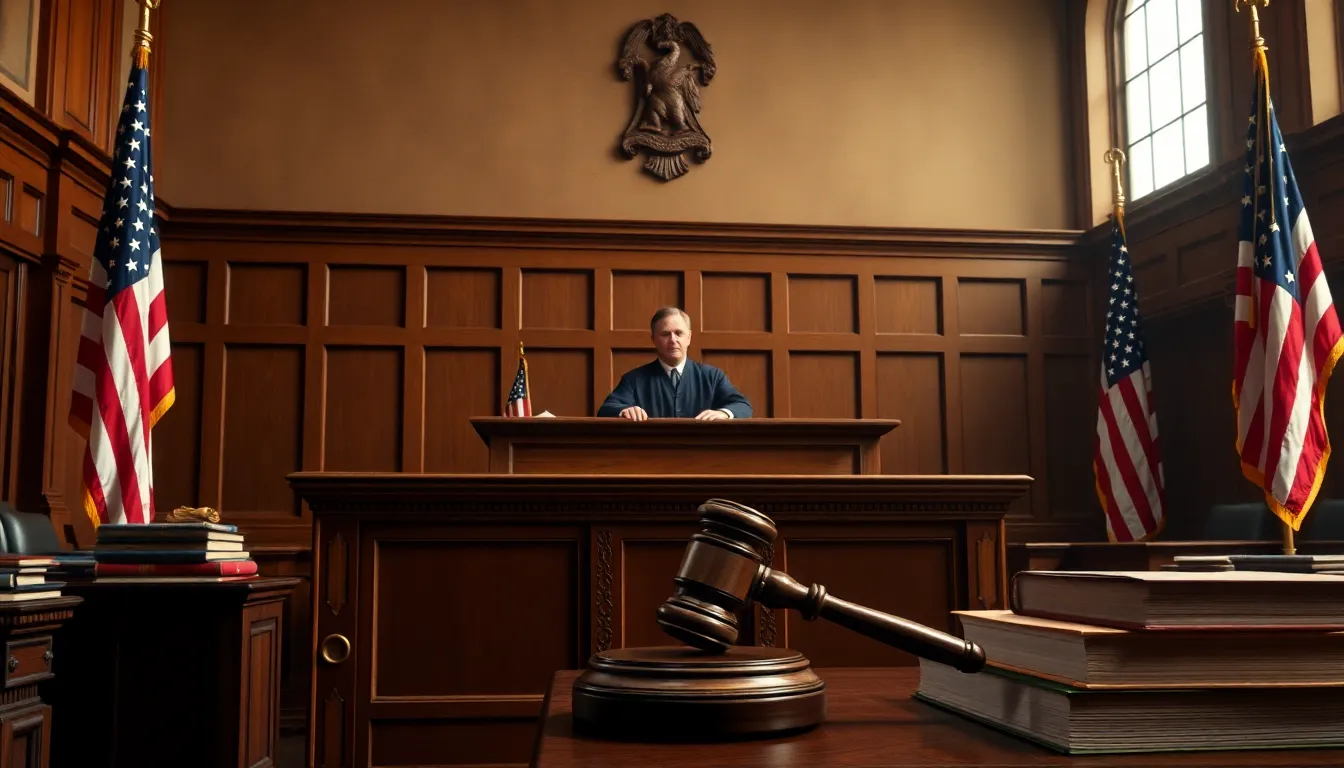Table of Contents
ToggleImagine walking into a courtroom without a lawyer by your side. It’s like diving into a pool without checking for water first—risky and a little crazy. The right to legal counsel isn’t just a fancy legal term; it’s a lifeline that ensures everyone gets a fair shot at justice. Whether it’s a minor traffic violation or a serious criminal charge, having a knowledgeable advocate can make all the difference.
In a world where legal jargon can sound more like a foreign language, the right to legal counsel helps level the playing field. It empowers individuals to navigate the complexities of the law with confidence. So, why should anyone face the legal system alone? Let’s dive into the importance of this fundamental right and explore how it shapes the landscape of justice for all.
Overview Of The Right To Legal Counsel
The right to legal counsel serves as a cornerstone of the justice system. It guarantees individuals access to legal representation, ensuring that everyone can defend their rights effectively. Courts recognize this right as essential for a fair trial. Not having a lawyer often leads to confusion about the legal process, increasing the risk of unfavorable outcomes.
Legal counsel provides expertise in navigating complex laws and procedures. Those facing criminal charges or civil disputes benefit significantly from having trained advocates. Studies show that individuals with representation are more likely to achieve favorable results in court. This shows the right’s crucial role in leveling the playing field.
Rights extend to defendants in criminal cases, where legal representation is constitutionally mandated. Under the Sixth Amendment, individuals cannot be deprived of counsel, regardless of financial circumstances. Legal aid organizations exist to assist those unable to afford private attorneys.
Representation also enhances understanding of legal rights. Lawyers clarify the implications of decisions, guiding clients through the intricacies of their cases. Knowledgeable counsel demystifies legal jargon, making the judicial process more accessible.
Notably, the right to counsel extends beyond criminal cases. Civil matters such as family disputes, housing, and employment issues also warrant legal assistance. Access to legal support influences outcomes across various legal landscapes.
Overall, the right to legal counsel embodies the principle of equal justice. By ensuring representation for all individuals, it upholds the integrity of the judicial system and reinforces the belief that everyone deserves a fair chance in legal proceedings.
Historical Context
The right to legal counsel has deep roots in legal history, evolving through significant milestones that emphasize its necessity in judicial proceedings.
Origins Of Legal Counsel Rights
Legal counsel rights trace back to ancient legal systems, where representation began to take shape. The Roman legal system recognized some form of representation by advocates. In England, the right to counsel emerged in the 13th century, notably in criminal matters. The Magna Carta of 1215 laid early groundwork, asserting that no individual should be deprived of legal representation. Slowly, these concepts broadened, influencing various legal systems and setting the stage for modern rights.
Landmark Cases
Landmark Supreme Court cases established and reinforced the right to legal counsel in the United States. Gideon v. Wainwright in 1963 marked a pivotal moment, ensuring that states must provide attorneys to defendants unable to afford them. This ruling emphasized that legal representation is a fundamental aspect of a fair trial. Similarly, Argersinger v. Hamlin in 1972 expanded this right, affirming that legal counsel is necessary even for misdemeanor offenses. These cases solidified the role of legal counsel in upholding justice and maintaining the integrity of the judicial process.
Importance Of Legal Counsel
Legal counsel plays a vital role in promoting justice. This representation not only ensures fair trials but also protects against potential injustices.
Impact On Fair Trials
Fair trials hinge on adequate legal representation. Courts recognize that individuals without lawyers often struggle to understand and navigate the legal system. This lack of guidance can lead to confusion and unfavorable outcomes. Studies show that defendants with legal counsel experience higher rates of acquittal or reduced sentences. Legal experts help individuals present their cases effectively, ensuring their rights are upheld. In summary, the presence of legal counsel significantly enhances the likelihood of achieving justice in trial settings.
Protection Against Injustice
Legal counsel provides essential protection against systemic injustices. Representation ensures that individuals are aware of their legal rights and options. Without such knowledge, people may inadvertently agree to unfavorable terms or plead guilty to charges without fully understanding the consequences. Lawyers act as advocates, fighting for clients’ rights in complex legal proceedings. These protections are especially crucial in vulnerable situations, such as family disputes or housing evictions. Access to competent legal counsel helps level the playing field and fosters a more equitable legal system.
Current Legal Framework
The right to legal counsel is supported by a robust legal framework at both national and international levels. This framework fortifies the principle of fair representation and ensures equal access to justice.
National Laws
In the United States, the Sixth Amendment serves as the foundation for the right to legal counsel in criminal cases. This constitutional mandate protects individuals from being deprived of legal representation, regardless of their financial status. Various state laws also reinforce this protection, establishing public defender systems to assist those unable to afford private attorneys. These laws enhance access to justice, ensuring that everyone receives adequate legal support. Additionally, federal statutes target specific areas, like the Juvenile Justice and Delinquency Prevention Act, which addresses legal representation for minors in delinquency proceedings. These comprehensive legal provisions make the right to legal counsel a vital aspect of the American judicial system.
International Treaties And Agreements
Internationally, several treaties and agreements reinforce the right to legal counsel. The International Covenant on Civil and Political Rights (ICCPR) affirms this right under Article 14, emphasizing that everyone is entitled to legal assistance in criminal matters. Numerous countries have incorporated similar principles into their domestic laws, aligning with global standards. The European Convention on Human Rights also echoes this sentiment, asserting the right to legal counsel in Article 6. These international instruments advocate for justice by ensuring that individuals receive competent legal representation, promoting equity across various jurisdictions. Together, these treaties highlight the universal recognition of the importance of legal counsel in safeguarding human rights.
Challenges And Limitations
Accessibility challenges impact the right to legal counsel significantly. Many individuals encounter barriers due to a lack of available legal resources, particularly in rural areas where legal aid services are limited. Geographic location often influences access, creating disparities in representation between urban and rural populations. Financial constraints further complicate this issue, as some individuals may fail to qualify for public defender services while still lacking the means to hire private attorneys. Language barriers also hinder non-English speakers from obtaining proper legal representation, affecting communication and understanding within the legal system.
Quality of legal representation varies widely, affecting outcomes for clients. Underfunded public defender systems often struggle to provide adequate resources and time to their cases. Attorneys overloaded with cases may not dedicate the necessary effort to each individual, resulting in insufficient defense strategies. Furthermore, differences in expertise and experience among attorneys can lead to inconsistent defense quality. In civil matters, many low-income clients find themselves without representation due to the absence of legal aid resources, leaving them vulnerable in complex legal situations. Quality representation remains crucial for securing just outcomes and maintaining trust in the legal system.
Conclusion
The right to legal counsel is a fundamental pillar of justice that ensures individuals can defend their rights effectively. Access to knowledgeable representation not only demystifies the legal process but also empowers individuals to navigate complex situations with confidence.
While challenges remain in achieving equal access to quality legal counsel, ongoing efforts to enhance legal aid resources and address systemic disparities are crucial. Upholding this right is essential for fostering trust in the judicial system and promoting fairness for all, regardless of their circumstances. Everyone deserves the opportunity to have their voice heard and their rights protected in legal matters.








